Regional forum “COVID-19 impact on the economy with special focus on social economy”
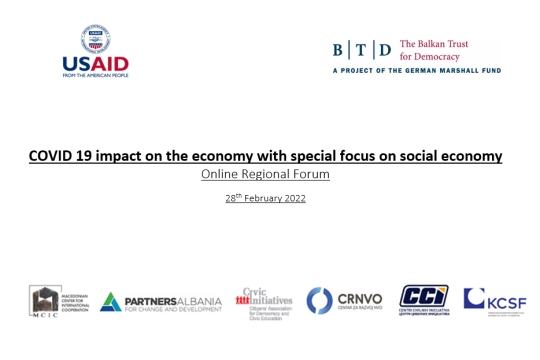
On February 28, 2022, the Macedonian Center for International Cooperation (MCIC) with the facilitation of Resource Centres for CSOs in the Balkan, organized a regional forum online with the participation of 70 representatives of civil society organizations, regional networks, international organizations, academia, private sector, media, relevant state institutions and other stakeholders from Northern Macedonia, Albania, Kosovo, Serbia, Montenegro and Bosnia and Herzegovina.
The aim of the regional forum was to discuss the current state of COVID-19 impact on the economy, particularly the social economy, highlighting key issues and challenges faced and measures are undertaken from all stakeholders’ points of view, thus contributing to sharing of experience, promoting of successful practices or adaptability in response to the COVID-19 outbreak.
During the regional forum, the key speakers emphasized that it is necessary to build the institutional framework for this type of entrepreneurship and at the same time to strengthen the awareness not only of the institutions but also of the citizens for the benefits of social enterprises. In addition, the speakers concluded that it is necessary to develop knowledge and skills on this topic, especially given that there is no formal education on the topic, at least not in all countries. While acknowledging that COVID-19 has accelerated digitalisation, they point out that, on the other hand, it has exposed the lack of technical skills.
The forum is organised in the frame of the regional project “Fostering regional cooperation and policy responses in time of crisis” implemented by 5 regional organizations serving as Resource Centre for civil society in their respective countries as, Partners Albania for Change and Development, Macedonian Center for International Cooperation, Center for Civic Initiatives, Centre for Development of Non-Governmental Organisations, Civic Initiatives and Kosovar Civil Society Foundation. The project is funded by the Balkan Trust for Democracy, a project of the German Marshall Fund of the United States and the USAID.
In the next months, 5 other Regional Thematic Forums will be organised discussing topics such civil society organisations response and adaptability; Voluntarism, solidarity and philanthropy in time of crisis; Access to services during the pandemic, with special focus on marginalised groups; Covid-19 impact on Youth sector and Human rights and access to information.
The next regional forum will be organised on 29 of March, 2022 on “Civil society organisations response and adaptability to Covid-19 situation”.
To participate in the forum https://bit.ly/3IGuT5L
Read More:
[gallery size="large" columns="4" ids="eyJ1cmwiOiJodHRwczpcL1wvcmVzb3VyY2VjZW50cmUuYWxcL3dwLWNvbnRlbnRcL3VwbG9hZHNcLzIwMjJcLzAzXC9rb3ZpZDUucG5nIiwidGl0bGUiOiJrb3ZpZDUiLCJjYXB0aW9uIjoiIiwiYWx0IjoiIiwiZGVzY3JpcHRpb24iOiIifQ==,eyJ1cmwiOiJodHRwczpcL1wvcmVzb3VyY2VjZW50cmUuYWxcL3dwLWNvbnRlbnRcL3VwbG9hZHNcLzIwMjJcLzAzXC9LT1ZJRDE1LWUxNjQ4NDc3MDE1NTc0LmpwZyIsInRpdGxlIjoiS09WSUQxNSIsImNhcHRpb24iOiIiLCJhbHQiOiIiLCJkZXNjcmlwdGlvbiI6IiJ9,eyJ1cmwiOiJodHRwczpcL1wvcmVzb3VyY2VjZW50cmUuYWxcL3dwLWNvbnRlbnRcL3VwbG9hZHNcLzIwMjJcLzAzXC9LT1ZJRDQtZTE2NDg0NzY5ODIyMjIuanBnIiwidGl0bGUiOiJLT1ZJRDQiLCJjYXB0aW9uIjoiIiwiYWx0IjoiIiwiZGVzY3JpcHRpb24iOiIifQ==,eyJ1cmwiOiJodHRwczpcL1wvcmVzb3VyY2VjZW50cmUuYWxcL3dwLWNvbnRlbnRcL3VwbG9hZHNcLzIwMjJcLzAzXC9LT1ZJRDctZTE2NDg0NzcwMDA3MjIuanBnIiwidGl0bGUiOiJLT1ZJRDciLCJjYXB0aW9uIjoiIiwiYWx0IjoiIiwiZGVzY3JpcHRpb24iOiIifQ=="]
Regional Forum “Human rights and access to information”
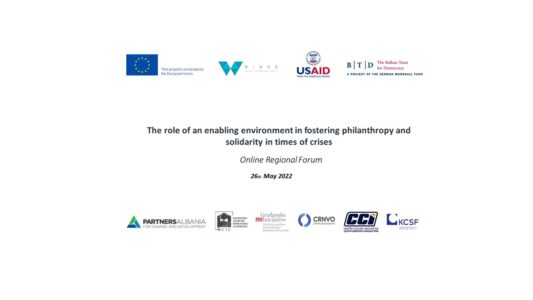
Access to information is a human right, is the message of the Regional Online Forum “Human Rights and Access to Information”, held on July 14, which gathered dozens of participants from the countries of the Western Balkans – representatives of civil society, institutions, private sector, donors, academic community, and media – through three panel discussions.
This was the sixth forum in a row within a series of regional forums that gather participants from Serbia, Bosnia and Herzegovina, Albania, Kosovo, North Macedonia, and Montenegro. The focus of this edition was on the importance of the role of human rights and access to information during the pandemic, emphasizing the legal aspects of enabling such activity, as well as the exchange of best practices of CSO solidarity related to this topic.
The forum was organized by Civic Initiatives, in partnership with organizations from the region: Macedonian Center for International Cooperation (MCIC), the Center for the Development of Non-Governmental Organizations from Montenegro, the Kosovar Civil Society Foundation (KCSF), Partners Albania and the Center for Civil Initiatives from BiH, with the support of the Balkan Fund for democracy, a project of the German Marshall Fund of the USA and USAID.
Bojana Selaković (Civil Initiatives) and Ariola Agolli (Partners of Albania for Change and Development) welcomed the participants of the Forum, and then three panel discussions were held.
In the first panel “Human rights during and after the COVID-19 pandemic”, regional, European and global perspectives in this area were discussed by Leo Pura (CSO Partnership for Development Effectiveness CPDE), Orsolya Reich (Civil Liberties Union for Europe) and Simona Mladenovska (Balkan Civil Society Development Network).
The current situation regarding the right to access information, from different perspectives – from CSOs dealing with transparency issues, to independent institutions and journalists, was discussed in the second panel, Access to information as a human right: Pandemic perspective, where Nada Maričić Đorđević (representative of the office of the Commissioner for Information of Public Importance), Ana Toskić Cvetinović (Partners Serbia), Rade Đurić (SafeJournalists network) and Nevena Ružić (Open Society Foundation) shared their views.
What difficulties do countries in the region face when it comes to access to information and how much does the restriction of that access affect civil society and the media, was the topic of the third panel, Restriction of information in the era of Kovid-19: the response of civil society. Natalija Jovanović (BIRN Serbia), Borka Rudić (Association of BH Journalists), Dren Gërguri (lecturer at the University of Pristina), Klejda Ngjela (CRD Albania), Bojana Laković Konatar (Trade Union of Media of Montenegro) and Biljana Nasteska Kalanoska (Association of Journalists of Macedonia) presented their experiences from their environments.
The participants of the Regional Forum agreed that during the pandemic, all countries of the Western Balkans went through almost the same difficulties – limiting access to information, which led to even greater fear among citizens, but also their distrust of institutions. It was also stated that previous experiences should serve as a lesson, and the Regional Forum as an opportunity – for organizations from the region to cooperate more in the future, to work together and achieve “synergy that was lacking in the past”.
Regional Forum “The role of an enabling environment in fostering philanthropy and solidarity in times of crises”

Partners Albania and the National Resource Centre for Civil Society held on May 26, 2022, the regional forum “The role of an enabling environment in fostering philanthropy and solidarity in times of crises” The regional event brought together in a virtual meeting about 135 representatives from civil society organisations, networks, public institutions, businesses, and donor representatives.
The regional forum aimed to present an overview of the role of philanthropy during the pandemic time by highlighting the legal aspects of enabling such activity and sharing best practices of innovation, solidarity, and voluntarism by CSOs and companies related to the topic.
Convinced as a vital meeting on philanthropy, particularly addressing the COVID-19 crises, the discussion in the forum was organized into two main sessions. The first session “Current State of the Legal Environment of Philanthropy in Europe and Global Context” included three speeches and highlighted the importance that an enabling environment for philanthropy has in order to address the pressing needs of the society and nurture the collaborations among different stakeholders. The second session “Current State of the Legal Environment in the Western Balkans” brought into focus the current legal framework on philanthropy in Bosnia and Hercegovina, Montenegro, North Macedonia, and Serbia and the challenges faced by CSOs in this regard.
Mrs. Ariola Agolli, manager of the National Resource Centre for Civil Society in Albania emphasized in her opening remark the key role and contribution that CSOs and the private sector had in coping with and addressing the COVID-19 effects. Further on, Mrs. Agolli highlighted the importance of such events, not only in promoting good practices and cases and creating synergies among different stakeholders but also to provide policy recommendations in order to address the challenges and bottlenecks that CSOs face in philanthropy.
First Session: “Current State of the Legal Environment of Philanthropy in Europe and Global Context”
The first session was addressed by Mr. Tiziano Blasi, senior project coordinator at WINGS, Mr. James Magowan, Coordinating Director at European Community Foundation Initiative, and Mrs. Kostandina Këruti, Program Manager at Partners Albania for Change and Development.
Some of the main points concerning the Current State of the Legal Environment of philanthropy in Europe and the Global Context discussed were:
• Barriers to registration, taxation and cross–border giving are three of the main legal challenges faced at the global level by philanthropy institutions;
• Political, economic, and social-cultural environments are factors that enable or hinder the development of philanthropic activity in a country;
• Community foundations as philanthropic organizations played an important role during the COVID-19 crisis and particularly are playing a crucial role in response to the Ukraine crisis.
• In Albania activities stipulated to benefit from tax incentives are very narrow;
• The bands of tax incentives are low. They serve more as “educational” purposes rather
than incentives for companies to donate;
Recommendations:
• The philanthropic space should be expanded, growth of philanthropy should be accelerating, and strong ecosystems should be built in order to scale up the enabling environment of philanthropy;
• Solidary and cooperation are important to addressing humanitarian and pandemic crises;
• The law on sponsorship in Albania should be amended by including a wide range of activities and increasing tax incentives to businesses for philanthropy.
• There is a need to have legal regulations in place to address digital developments such as crowdfunding platforms.
Second Session: “Current State of the Legal Environment in the Western Balkans”
The second session was addressed by Mr. Vuk Vukovic, research and analysis manager at Catalyst Balkans from Serbia, Mrs. Nikica Kusikinova, director at Konekt from North Macedonia, Ms. Aida Vežić, program coordinator at Mozaik Foundation from Bosnia and Herzegovina, and, Mrs. Anica Maja Boljević, executive director of Fakt from Montenegro.
Some of the main points concerning the Current State of the Legal Environment of philanthropy in the Western Balkans were:
• Philanthropy in the region is treated more like a charity activity rather than an intervention with long-term impact.
• There is no register of official state institutions in Western Balkans that gather and monitor the trends of giving and the estimation of giving’s are mainly taken from the monitoring of media;
• During the pandemic situation of COVID-19, a vast majority of giving was given to health care.
• Two worrying trends are seen during these pandemic times: lots of the donations are channeled to public institutions to address inefficiencies of the work of the public administration and there is a decreased trend of donations towards CSOs.
• Tax relief procedures are burdensome for the donors and recipients of donations, contributing to hindering philanthropic activity.
Recommendations:
• It is crucial for the policymakers to enable tax relief and fiscal incentives for individuals and business companies
• The procedures concerning tax relief should be easy and straightforward without penalizing the donor or recipient of donations.
• More capacity-building and financial institutional support to CSOs and Support Infrastructure Organizations in order to maximize the environment of philanthropy CSOs and should have more institutional support
we need to provide institutional support to CSOs
• It is important that the media focus also on philanthropy and present data, facts, and cases that happen concerning donations
• Changes in the laws should be harmonized among each other’s, and increase active involvement of public and private institutions to advance the enabling environment for philanthropy in the Western Balkan Countries
[gallery size="large" columns="4" ids="eyJ1cmwiOiJodHRwczpcL1wvcmVzb3VyY2VjZW50cmUuYWxcL3dwLWNvbnRlbnRcL3VwbG9hZHNcLzIwMjJcLzA3XC8yODIzNzY5MzhfMjExMzMxMjQ4NTQ5NDgzNV83OTg4Mjc2ODIyMjczMjU4NDk1X24tZTE2NTY5MzE1MjA0MTcucG5nIiwidGl0bGUiOiIyODIzNzY5MzhfMjExMzMxMjQ4NTQ5NDgzNV83OTg4Mjc2ODIyMjczMjU4NDk1X24iLCJjYXB0aW9uIjoiIiwiYWx0IjoiIiwiZGVzY3JpcHRpb24iOiIifQ==,eyJ1cmwiOiJodHRwczpcL1wvcmVzb3VyY2VjZW50cmUuYWxcL3dwLWNvbnRlbnRcL3VwbG9hZHNcLzIwMjJcLzA3XC8yODM2NTQwNjFfMjExMzMwMTYwMjE2MjU5MF8yNjI1NjA5NzAyOTA1NTcyMDg5X24tZTE2NTY5MzE1MzUyNjMucG5nIiwidGl0bGUiOiIyODM2NTQwNjFfMjExMzMwMTYwMjE2MjU5MF8yNjI1NjA5NzAyOTA1NTcyMDg5X24iLCJjYXB0aW9uIjoiIiwiYWx0IjoiIiwiZGVzY3JpcHRpb24iOiIifQ==,eyJ1cmwiOiJodHRwczpcL1wvcmVzb3VyY2VjZW50cmUuYWxcL3dwLWNvbnRlbnRcL3VwbG9hZHNcLzIwMjJcLzA3XC8yODI2MzI4MDNfMjExMzMwMjY0ODgyOTE1Ml80NDM4OTE1ODE1NTc3OTQzMTQ0X24tZTE2NTY5MzE1NDc5MzQucG5nIiwidGl0bGUiOiIyODI2MzI4MDNfMjExMzMwMjY0ODgyOTE1Ml80NDM4OTE1ODE1NTc3OTQzMTQ0X24iLCJjYXB0aW9uIjoiIiwiYWx0IjoiIiwiZGVzY3JpcHRpb24iOiIifQ==,eyJ1cmwiOiJodHRwczpcL1wvcmVzb3VyY2VjZW50cmUuYWxcL3dwLWNvbnRlbnRcL3VwbG9hZHNcLzIwMjJcLzA3XC8yODM4MDUxODNfMjExMzMwMzgwODgyOTAzNl81NTk5MTM4MjEzMjI4NjUxNjc2X24tZTE2NTY5MzE1NjA1MDgucG5nIiwidGl0bGUiOiIyODM4MDUxODNfMjExMzMwMzgwODgyOTAzNl81NTk5MTM4MjEzMjI4NjUxNjc2X24iLCJjYXB0aW9uIjoiIiwiYWx0IjoiIiwiZGVzY3JpcHRpb24iOiIifQ==,eyJ1cmwiOiJodHRwczpcL1wvcmVzb3VyY2VjZW50cmUuYWxcL3dwLWNvbnRlbnRcL3VwbG9hZHNcLzIwMjJcLzA3XC8yODE4NjE3NDVfMjExMzMwMjY0MjE2MjQ4Nl82MTQ4ODU5NDQxNzY3MzQwMTEwX24tZTE2NTY5MzE1NzM5MTkucG5nIiwidGl0bGUiOiIyODE4NjE3NDVfMjExMzMwMjY0MjE2MjQ4Nl82MTQ4ODU5NDQxNzY3MzQwMTEwX24iLCJjYXB0aW9uIjoiIiwiYWx0IjoiIiwiZGVzY3JpcHRpb24iOiIifQ==,eyJ1cmwiOiJodHRwczpcL1wvcmVzb3VyY2VjZW50cmUuYWxcL3dwLWNvbnRlbnRcL3VwbG9hZHNcLzIwMjJcLzA3XC8yODQxMDQ4OTlfMjExNDAyNjcyMjA5MDA3OF80MDczODUyNTM1MjkyNjI4NTk5X24tZTE2NTY5MzE1ODY4NDAucG5nIiwidGl0bGUiOiIyODQxMDQ4OTlfMjExNDAyNjcyMjA5MDA3OF80MDczODUyNTM1MjkyNjI4NTk5X24iLCJjYXB0aW9uIjoiIiwiYWx0IjoiIiwiZGVzY3JpcHRpb24iOiIifQ==,eyJ1cmwiOiJodHRwczpcL1wvcmVzb3VyY2VjZW50cmUuYWxcL3dwLWNvbnRlbnRcL3VwbG9hZHNcLzIwMjJcLzA3XC8yODM0NzA4NjFfMjExMzMxMjQ5NTQ5NDgzNF8yNzE2ODY5MzQ1NDQyMTUxOTUyX24tZTE2NTY5MzE1OTg0OTEucG5nIiwidGl0bGUiOiIyODM0NzA4NjFfMjExMzMxMjQ5NTQ5NDgzNF8yNzE2ODY5MzQ1NDQyMTUxOTUyX24iLCJjYXB0aW9uIjoiIiwiYWx0IjoiIiwiZGVzY3JpcHRpb24iOiIifQ==,eyJ1cmwiOiJodHRwczpcL1wvcmVzb3VyY2VjZW50cmUuYWxcL3dwLWNvbnRlbnRcL3VwbG9hZHNcLzIwMjJcLzA3XC8yODE4NzcwNTBfMjExMzMwNTAzODgyODkxM183Nzc5MjUxODUzODI1MzE4ODU3X24tZTE2NTY5MzE2MDk5ODQucG5nIiwidGl0bGUiOiIyODE4NzcwNTBfMjExMzMwNTAzODgyODkxM183Nzc5MjUxODUzODI1MzE4ODU3X24iLCJjYXB0aW9uIjoiIiwiYWx0IjoiIiwiZGVzY3JpcHRpb24iOiIifQ==,eyJ1cmwiOiJodHRwczpcL1wvcmVzb3VyY2VjZW50cmUuYWxcL3dwLWNvbnRlbnRcL3VwbG9hZHNcLzIwMjJcLzA3XC8yODQwOTkyNTNfMjExMzMwNTAxMjE2MjI0OV81ODI3NDk4ODU1NTQzMDMwNjg3X24tZTE2NTY5MzE2MjAyOTQuanBnIiwidGl0bGUiOiIyODQwOTkyNTNfMjExMzMwNTAxMjE2MjI0OV81ODI3NDk4ODU1NTQzMDMwNjg3X24iLCJjYXB0aW9uIjoiIiwiYWx0IjoiIiwiZGVzY3JpcHRpb24iOiIifQ==,eyJ1cmwiOiJodHRwczpcL1wvcmVzb3VyY2VjZW50cmUuYWxcL3dwLWNvbnRlbnRcL3VwbG9hZHNcLzIwMjJcLzA3XC8yODQ4NDg1NTlfMjExMzMwNTAwODgyODkxNl84NTQ3NTE2NjQ1ODQ3MzE3NTE4X24tZTE2NTY5MzE2MzM0ODYuanBnIiwidGl0bGUiOiIyODQ4NDg1NTlfMjExMzMwNTAwODgyODkxNl84NTQ3NTE2NjQ1ODQ3MzE3NTE4X24iLCJjYXB0aW9uIjoiIiwiYWx0IjoiIiwiZGVzY3JpcHRpb24iOiIifQ==,eyJ1cmwiOiJodHRwczpcL1wvcmVzb3VyY2VjZW50cmUuYWxcL3dwLWNvbnRlbnRcL3VwbG9hZHNcLzIwMjJcLzA3XC8yODI2NzE3OTRfMjExMzMwNDk5NTQ5NTU4NF84NjE3Njg1MzYzNjc2ODQ2MDgwX24tZTE2NTY5MzE2NDQ4MTcuanBnIiwidGl0bGUiOiIyODI2NzE3OTRfMjExMzMwNDk5NTQ5NTU4NF84NjE3Njg1MzYzNjc2ODQ2MDgwX24iLCJjYXB0aW9uIjoiIiwiYWx0IjoiIiwiZGVzY3JpcHRpb24iOiIifQ=="]
Regional Forum “Youth’s efficiency and resilience during COVID-19 pandemic – today’s perspective in the Western Balkans”

Centers for Civic initiative (CCI) from Bosnia and Herzegovina held on 24th June 2022, the regional forum “Youth’s efficiency and resilience during COVID -19 pandemic – today’s perspective in the Western Balkans”. The Forum gathered more than 50 participants from B&H, Albania, Kosovo, North Macedonia, Serbia and Montenegro, including the representatives of OECD, regional networks, international organizations, the academic community, media, governments and other relevant actors.
The Forum aims to present an overview of the role of Youth during the pandemic time, by highlighting the legal aspects of enabling such activity, as well as sharing best practices of solidarity by CSOs related to the topic. Further on, the forum will also address the situation of inter-sectoral coordination to respond as well as inclusion of stakeholders. Finally, at this forum, policy recommendations will be proposed to address the problems and reduce the pandemic effects on youth.
Some of the conclusions from the event have pointed to the following facts that defined the position of the youth in the Western Balkans countries during the COVID 19 pandemic:
-During the COVID 19 pandemic youth in the most of the countries in the region felt direct consequences of this phenomenon that swept the world: online education, restricted movement, isolation, social distancing in very sensitive age, disruption of the labor market where numbers lost their job, etc. And, until today there was no thorough analysis done, on the Balkans and wider, that would provide the assessment of negative psychosocial effects of the COVID 19 pandemic on youth-other researches have shown that the vulnerability of the children and youth was reflected in greater susceptibility to develop serious psychological consequences.
-During the whole period of the pandemic, youth in all countries of the region has shown outstanding courage, social sensitivity and solidarity with the most endangered groups and individuals and in many noticed situations helped voluntarily to their fellow citizens
-In Bosnia and Herzegovina and most of other countries in the region youth organizations have not been involved in the processes of planning of preventive and operational measures for fighting COVID 19. There were some sporadic examples, but that cooperation has not been fully used for functional dialog and has not responded to the actual needs of youth and their organizations but has been used as formal cover for minimum activities of the ministries in the youth sector
This regional forum is organized under the regional project “Fostering Regional Cooperation and Policy Responses in Time of Crisis,” funded by the Balkan Trust for Democracy (a project of the German Marshall Fund) and USAID, and implemented by: Partners Albania for Change and Development, the Macedonian Center for International Cooperation, the Centers for Civic Initiatives, the Centre for Development of Non Governmental Organizations, Civic Initiatives, and the Kosovar Civil Society Foundation.
Round table “Monitoring Matrix on Enabling Environment for Civil Society Country Report for Albania 2018”
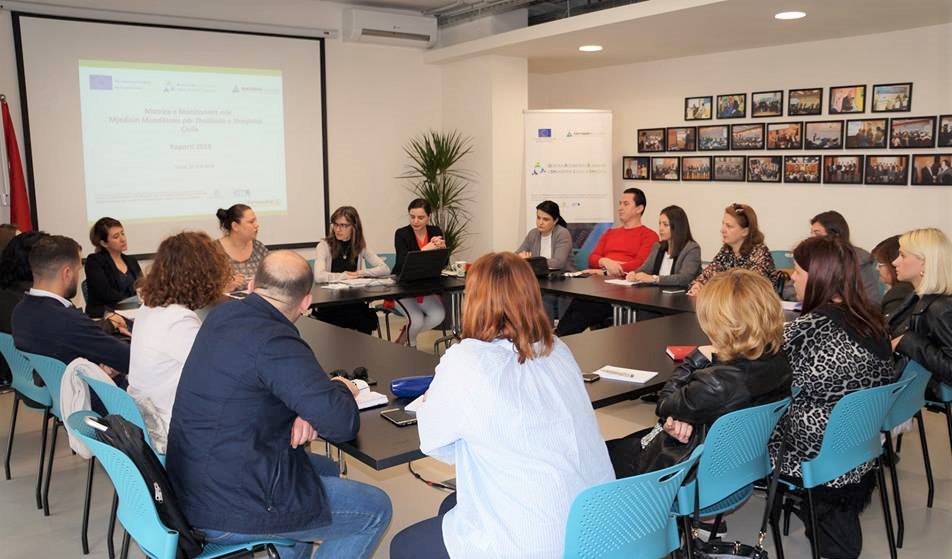
Partners Albania and National Resource Centre for Civil Society organized in May 2019, a round table to present the preliminary findings and recommendations of the “Monitoring Matrix on Enabling Environment for Civil Society – Country Report for Albania 2018”. The meeting served as a discussion forum focused on an analysis of the changes and development of the legal and practical framework affecting the sector occurred during January 2018- February 2019.
Participants were Ms. Alketa Knuti, Deputy Director of General Tax Directorate, representatives of Agency for the support of the Civil Society (ASCS) , representatives of civil society organizations and donor institution in the country.
The following are some of the main findings:
Burdensome reporting procedures and formats, and poor implementation of the consultation processes on draft laws and policies, especially at the central level of government.
The Road Map for Drafting Policies and Measures for Enabling Environment for Civil society 2015-2018, resulted with only 20% of its actions implemented, while the new action plan 2018-2022 has not yet been approved.
The National Council for Civil Society Development is still struggling in its efforts to build a constructive and effective dialogue in advancing the civil society agenda.
The legal package on Social Enterprise is not in line with EU directive and European best practices, presenting several restrictions and state controlling mechanisms for CSOs deriving from the status of SE.
For more findings and recommendations, please read the report.
Screening Report Albania
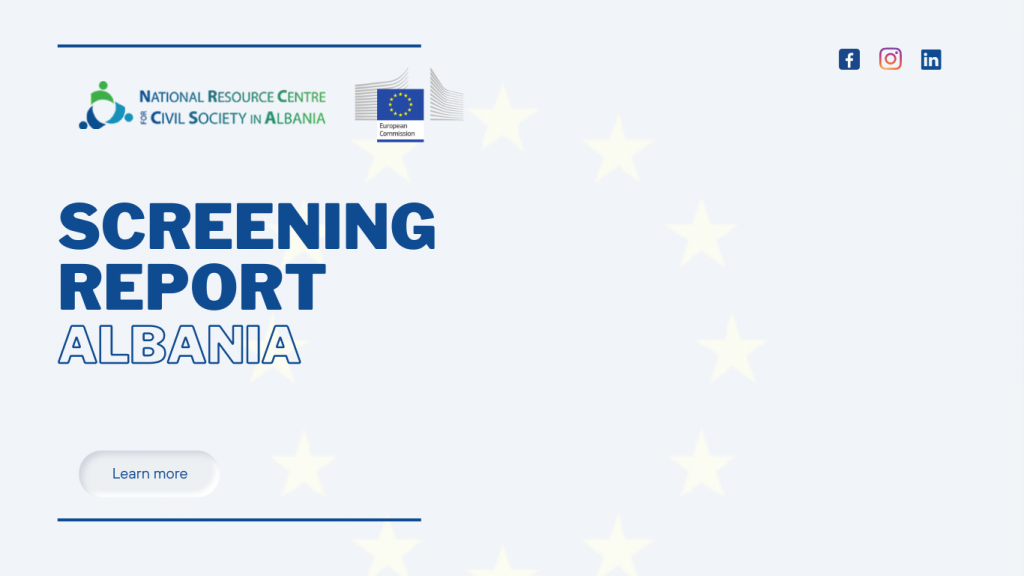
The European Commission has published the Screening Report for Albania one year after the opening of negotiations for Albania’s membership in the EU and the end of the first round of meetings. The report highlights Albania’s progress towards the EU, the main challenges in the country and achievements in crucial reforms. Among other things, the report also dwells on the review of the legal framework and policies for civil society in the country, evaluating the establishment and improvement of the regulatory and institutional framework, but emphasizes that its implementation needs to be further strengthened.
The report emphasizes the importance of structures such as the National Resource Center for Civil Society, which is regarded as an information and support platform on consultative and policy-making processes for the sector and other partners.
The findings of the European Commission report coincide with the findings of the Monitoring Matrix on Enabling Environment for CSOs Development, Country Report for Albania 2022 prepared by Partners Albania, and its recommendations are consistent with a series of issues that underlie our advocacy efforts for a more enabling environment for the sector, such as progress in the law on volunteering, the establishment and operation of the National Electronic Register of NGO/CSOs, the facilitation of VAT refund procedures, the establishment of incentives for individual donations, etc.
Since February 2023 restarted the annual program of the NPOs Academy
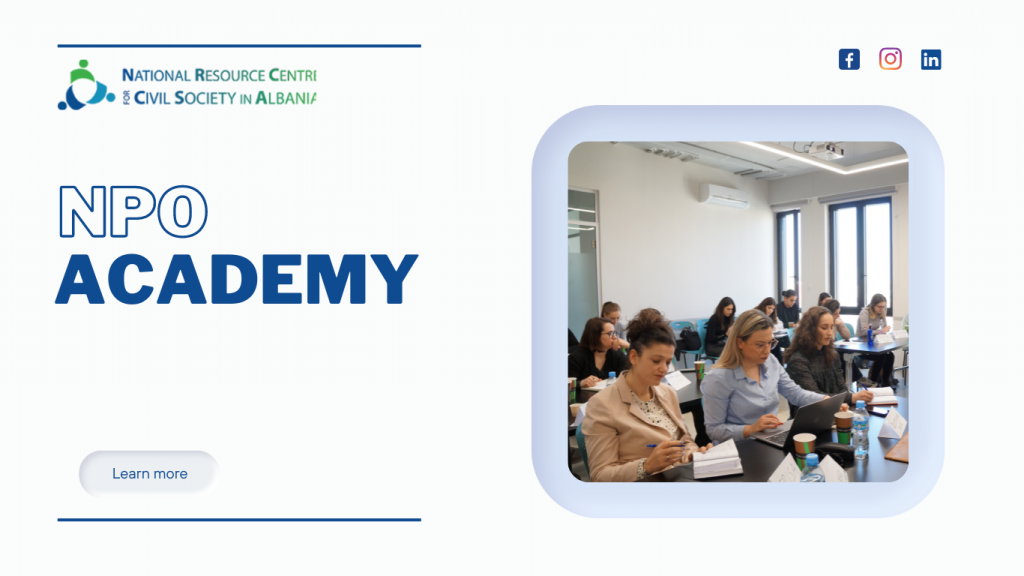
The NPO Academy, in its 9th year of organisation, is a consolidated program, one of the most sought after in the sector as it is valued by NPOs as one of the only programs that support the formation of leaders and staff of organisations in all aspects of organisational development and management and beyond. For more information, find here the program.
Following an open call for expressions of interest, 26 representatives of CSOs will attend this year’s Academy. The Academy’s program includes 11 lectures by local and international lecturers, as well as discussions with guest experts, mentoring sessions for participants and their organisations throughout the year, participation in study visits to businesses and institutions, and participation in various events and networking activities of the Resource Centre and beyond.
The first two lectures on the “Legal Framework for NPOs in Albania” and “EU integration process and CSOs role” were organized respectively in the months of February and March.
[gallery columns="2" ids="eyJ1cmwiOiJodHRwczpcL1wvcmVzb3VyY2VjZW50cmUuYWxcL3dwLWNvbnRlbnRcL3VwbG9hZHNcLzIwMjNcLzA1XC9EU0MwOTIxMi1zY2FsZWQuanBnIiwidGl0bGUiOiJEU0MwOTIxMiIsImNhcHRpb24iOiIiLCJhbHQiOiIiLCJkZXNjcmlwdGlvbiI6IiJ9,eyJ1cmwiOiJodHRwczpcL1wvcmVzb3VyY2VjZW50cmUuYWxcL3dwLWNvbnRlbnRcL3VwbG9hZHNcLzIwMjNcLzA1XC9EU0MwOTE0OC1zY2FsZWQuanBnIiwidGl0bGUiOiJEU0MwOTE0OCIsImNhcHRpb24iOiIiLCJhbHQiOiIiLCJkZXNjcmlwdGlvbiI6IiJ9"]Av. Ardjana Shehi, an expert with more than 25 years of professional work experience in the non-profit sector’s legal field, notably with regard to the legal framework governing the NPO tax regime, directed the first lecture. Gledis Gjipali, Executive Director of the European Movement Albania (EMA), researcher and expert on issues related to the EU accession process, member of the work teams for the drafting of strategic documents such as the National Plan for the Approximation of Legislation, the National Plan for the implementation of the SAA, etc., as well as a member of Albania – EU working group, led the second lecture.
Strengthening accountability, transparency and sustainability of civil society organizations – Code of Standards for CSOs
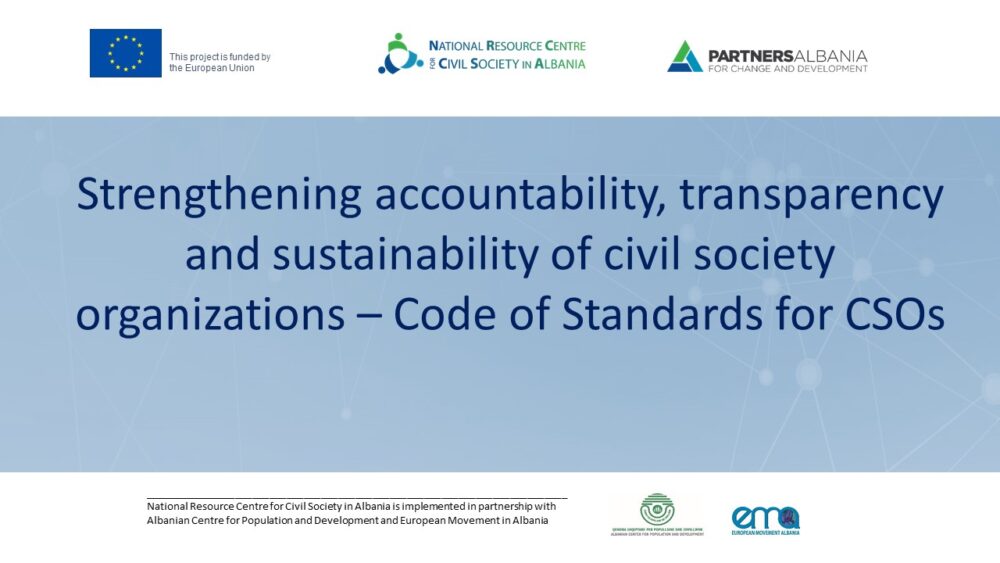
During these months, the National Resource Centre has continued the work of drafting the Code of Standards for CSOs, an early initiative of Partners Albania, which was re-introduced in the sector last year, in order to create a self-assessment mechanism that will contribute to raising the standards of activity of CSOs, their transparency, accountability and good governance.
After organizing a series of information and consultation meetings, about 200 CSOs participating in the meetings were invited to join a working group for further development of the Code. 18 organizations that expressed their interest joined the Resource Centre and Partners Albania and became part of the working group of the Code of Standards.
Based on the experience of the Balkan Civil Society Development Network (BCSDN) and other CSOs around the globe, part of the Global Standards Initiative, the Code of Standards was further developed by experts and the working group, tailored with the dynamics of sector development in Albania.
The Code is structured in 4 main principles and 7 commitments that CSOs member must meet and maintain. In parallel with the Code, the working group has worked on the development of a Self-Assessment Questionnaire, with measurable indicators, which will serve as an Assessment Framework for fulfilling the commitments of the Code.
The Code of Standards will be presented and widely shared with the nonprofit sector and stakeholders interested in a series of online online meetings that the Centre will organize in the upcoming months.
Strengthening CSO networks and coalitions in Albania for more initiatives and greater impact
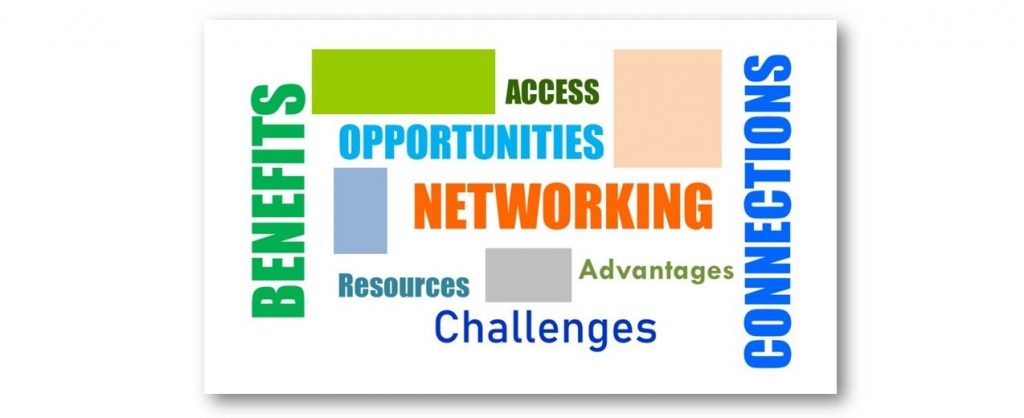
The Centre has continued even in this quarterly to provide support to further strengthening the capacity of networks, coalitions and formal and informal groupings of CSOs, through the technical assistance program. So far, as part of the program the networks have been assisted in:
National Climate Network – internal consolidation of the network through the drafting of a Strategic Plan and the drafting of an Advocacy Plan on the initiative for drafting the climate law in Albania.
Young Professionals Network – drafting a Strategic Plan for network development in the next three years.
Civil Forum Selenica – drafting a Fundraising Plan, in support of their advocacy initiatives and drafting human resources policies.
The grouping for the development of volunteering has continued with meetings and assistance on volunteering the legal framework.
In addition to mentoring and assistance sessions specifically designed based on the needs and priorities of the networks, as part of the training programs, the Centre has also conducted several trainings for member organizations of the networks in project proposals writing and fundraising. For more details on the results and beneficiaries of the assistance program read here.
The Centre continues to cooperate with networks and support them to facilitate communication processes with institutions in the country, other organizations and experts, to address issues in focus of network’s activity.
[gallery size="medium" ids="eyJ1cmwiOiJodHRwczpcL1wvcmVzb3VyY2VjZW50cmUuYWxcL3dwLWNvbnRlbnRcL3VwbG9hZHNcLzIwMjFcLzAxXC8xMzE0MTYxNTRfMTcxMDc3NjMwOTA4MTc5MF81MDg4MTc0NzE0MDMxNjAxNDA1X28tZTE2NDUxOTI2MzQ0ODIucG5nIiwidGl0bGUiOiIxMzE0MTYxNTRfMTcxMDc3NjMwOTA4MTc5MF81MDg4MTc0NzE0MDMxNjAxNDA1X28iLCJjYXB0aW9uIjoiTmF0aW9uYWwgQ2xpbWF0ZSBOZXR3b3JrIiwiYWx0IjoiIiwiZGVzY3JpcHRpb24iOiIifQ==,eyJ1cmwiOiJodHRwczpcL1wvcmVzb3VyY2VjZW50cmUuYWxcL3dwLWNvbnRlbnRcL3VwbG9hZHNcLzIwMjFcLzAxXC8xMzE4OTU1NzZfMTcxMjM0Mjk2MjI1ODQ1OF84MzMzMjE0MzQ0Mjc0NDYwMzg2X28tZTE2NDUxOTI2MTc1OTMuanBnIiwidGl0bGUiOiIxMzE4OTU1NzZfMTcxMjM0Mjk2MjI1ODQ1OF84MzMzMjE0MzQ0Mjc0NDYwMzg2X28iLCJjYXB0aW9uIjoiWW91bmcgUHJvZmVzc2lvbmFscyBOZXR3b3JrIiwiYWx0IjoiIiwiZGVzY3JpcHRpb24iOiIifQ==,eyJ1cmwiOiJodHRwczpcL1wvcmVzb3VyY2VjZW50cmUuYWxcL3dwLWNvbnRlbnRcL3VwbG9hZHNcLzIwMjFcLzAxXC8xMzE5MjcwMTNfMTcxMTYwODc0ODk5ODU0Nl84MDQ5NDMxMDE3NzU4MzEwNTU3X28tZTE2NDUxOTI2MDI5MDYuanBnIiwidGl0bGUiOiIxMzE5MjcwMTNfMTcxMTYwODc0ODk5ODU0Nl84MDQ5NDMxMDE3NzU4MzEwNTU3X28iLCJjYXB0aW9uIjoiU2VsZW5pY2EgQ2l2aWwgRm9ydW0iLCJhbHQiOiIiLCJkZXNjcmlwdGlvbiI6IiJ9,eyJ1cmwiOiJodHRwczpcL1wvcmVzb3VyY2VjZW50cmUuYWxcL3dwLWNvbnRlbnRcL3VwbG9hZHNcLzIwMjFcLzA0XC9WdWxsbmV0YXJpem1pLTIyLjAxLjIwMjEuanBnIiwidGl0bGUiOiJWdWxsbmV0YXJpem1pIDIyLjAxLjIwMjEiLCJjYXB0aW9uIjoiIiwiYWx0IjoiIiwiZGVzY3JpcHRpb24iOiIifQ==,eyJ1cmwiOiJodHRwczpcL1wvcmVzb3VyY2VjZW50cmUuYWxcL3dwLWNvbnRlbnRcL3VwbG9hZHNcLzIwMjFcLzA0XC9Sci4tUHJvZi1Bc2lzdGVuY2EuanBnIiwidGl0bGUiOiJSci4gUHJvZiBBc2lzdGVuY2EiLCJjYXB0aW9uIjoiIiwiYWx0IjoiIiwiZGVzY3JpcHRpb24iOiIifQ=="]
Study Visits of the NPO Academy 2020 participants
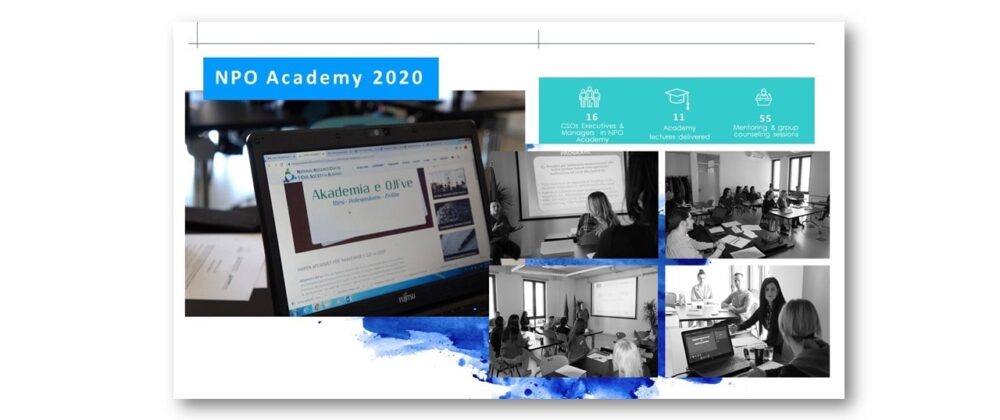
This year of the NPO Academy 2020 brings us to virtual meetings and introductory visits to important public and private institutions. As part of Academy visits, participants had the opportunity to discuss with representatives of:
ONE Telecommunications , Mrs. Sibel Pipa and Mr. Verdi Norja, the support and contribution that provides to CSOs for their initiatives on opportunities for bilateral cooperation ;
Albanian Parliament , Mrs. Ejona Manjani, structures, procedures for the involvement of NPOs in the consultation processes, as well as the intersectoral cooperation;
National Council for Civil Society, Mr. Blendi Dibra, the undertaken work and initiatives by the Council during its mandate, focusing on the challenges encountered.
[gallery size="medium" ids="eyJ1cmwiOiJodHRwczpcL1wvcmVzb3VyY2VjZW50cmUuYWxcL3dwLWNvbnRlbnRcL3VwbG9hZHNcLzIwMjFcLzAxXC8xMjg5NDg4NjRfMTcwMDgwNDY4MzQxMjI4Nl81MjA2MjM0NTA0NDY4Mjk4N19vLWUxNjQ1MTkyNjgyODkxLnBuZyIsInRpdGxlIjoiMTI4OTQ4ODY0XzE3MDA4MDQ2ODM0MTIyODZfNTIwNjIzNDUwNDQ2ODI5ODdfbyIsImNhcHRpb24iOiIiLCJhbHQiOiIiLCJkZXNjcmlwdGlvbiI6IiJ9,eyJ1cmwiOiJodHRwczpcL1wvcmVzb3VyY2VjZW50cmUuYWxcL3dwLWNvbnRlbnRcL3VwbG9hZHNcLzIwMjFcLzAxXC8xMjg5MTc5ODFfMTcwMDgwNDY5Njc0NTYxOF84MDcxNTI0NjI3NzkwNjIyNjQ3X28tZTE2NDUxOTI2OTk2MjUucG5nIiwidGl0bGUiOiIxMjg5MTc5ODFfMTcwMDgwNDY5Njc0NTYxOF84MDcxNTI0NjI3NzkwNjIyNjQ3X28iLCJjYXB0aW9uIjoiIiwiYWx0IjoiIiwiZGVzY3JpcHRpb24iOiIifQ==,eyJ1cmwiOiJodHRwczpcL1wvcmVzb3VyY2VjZW50cmUuYWxcL3dwLWNvbnRlbnRcL3VwbG9hZHNcLzIwMjFcLzAxXC8xMjk3MDg4NzRfMTcwMDgwNDY5MDA3ODk1Ml81NjQ5NTg0NTI2OTgxNDg5MDAxX28tZTE2NDUxOTI2Njc5MDkucG5nIiwidGl0bGUiOiIxMjk3MDg4NzRfMTcwMDgwNDY5MDA3ODk1Ml81NjQ5NTg0NTI2OTgxNDg5MDAxX28iLCJjYXB0aW9uIjoiIiwiYWx0IjoiIiwiZGVzY3JpcHRpb24iOiIifQ=="]

